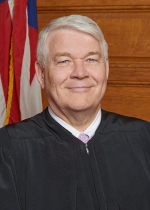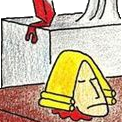Tuvell v. Marshall ⸻ Story │ Record │ Discussion
► At first glance, this Case Study may seem strangely out-of-place here, dealing as it does with a (State) Tort (Defamation, “CyberLibel”), rather than (Federal) Judicial Misconduct (largely Criminal, see Tuvell v. IBM). But the singular circumstances of the case make it very suitable for our study — as an object-lesson in the closed-mindedness of (some sectors of) the American public to the taboo subject of Judicial Misconduct.
Namely, this case illustrates how difficult it is for victims of Judicial Misconduct to make their voices heard — not just in specialized courtroom settings, but in the generalized public/Internet forum of ideas/conversation/dialectic. For in this case, the Plaintiff was inexplicably/unmercifully pilloried/excoriated for merely attempting to appropriately raise a discussion of Judicial Misconduct, on a (self-professedly) well-known (self-professed) open-minded/open-opinion blogsite, hosted by a (self-professed) lawyer and (self-professed) professional legal ethicist(!). “With ‘friends’ like those, who needs ‘enemies’?”
Besides that object-lesson, this case additionally presents a rather extreme legal novelty: its resolution requires (in part) the State defendant/judge/jury to consider/examine/inspect a Federal case (Tuvell v. IBM), and determine whether or not the judge there (Casper) committed Federal offenses there (Judicial Misconduct, crimes such as Falsification of Facts and Obstruction of Justice, etc.)! ◄

Beginning
The Defendant in this case, Jack Marshall, is a lawyer and (self-professed) professional ethicist (with special expertise in legal ethics) of long standing in Alexandria, Virginia, founder and president of a nationwide company, ProEthics Ltd. ⌥, which specializes in ethics education/training/consulting. On the side (though quite prolifically) he also runs a “blog/forum/commentary-site” (see How to Use Forums for definitions), EthicsAlarms, which (self-)professes to be “the per-eminent [sic] and most visited ethics commentary blog on the web” ⌥.
The Plaintiff, Walter Tuvell, first learned of the EthicsAlarms blogsite on Aug 2 2017, when he tripped upon it while doing some Internet research (Google search unrelated to Judicial Misconduct). Immediately attracted by the prospect of raising a serious discussion of Judicial Misconduct (closely related to judicial/legal ethics) on the seemingly serious site, Plaintiff visited EthicsAlarms to read some of its blog posts and follow-up comments. But he was initially taken aback to observe the site seemed to be primarily concerned with partisan politics, wrapped in a thin veneer/sheen of ethics-like/lite language — as opposed to serious whole-life ethics (legal-oriented or not), per se, as advertised on the site’s About page ⌥. And not only that, but as a secondary observation, Plaintiff noticed that EthicsAlarms seemed to be mostly “right-leaning” (that is, anti-left/towards-right, as indeed Marshall himself observed shortly afterward, on Sep 19 ⌥, where Still Spartan writes “I haven’t been writing here a lot lately, and I have noticed that a lot or other liberal-leaning commenters have dropped as well,” and Marshall responds “I have many theories about the progressive exodus [followed by incoherent ramble]”). And so, uncertain that raising a non-partisan/political topic (such as Judicial Misconduct) would be welcome on the site, Plaintiff postponed doing so, opting instead to settle into a routine of “following” (checking-in with, i.e., scanning/reading to get the gist of) EthicsAlarms for a few weeks, to gauge whether the political/partisan content he’d stumbled into was a permanent feature, or was a temporary aberrational deviation from the About page’s proclaimed “pure” design/intent (which hinted nothing whatever about partisanship, politics, right-wing conservatism, etc., much less being a “satirical” site).
Middle
After several weeks of monitoring EthicsAlarms, but seeing no let-up in its markedly political/partisan orientation (often devolving to invective/rants/name-calling, with an unmistakable right-leaning slant by Marshall and most of his commenters (except for a very few contrarian commenters)), Plaintiff wrote to Defendant, privately, politely inquiring as to the accuracy of his observations (disparity between the “high-minded” intellectual/honest desgn-intent of the About page, vs. the “low-minded” blog/comment dishonest mudfight contents of the actual implementation) — without judgmentality however: that is, without criticizing/complaining/accusing/condemning/reprimanding/taking-to-task the blogsite for its focus on politics/partisanship, or for “taking sides” (one way or the other, left vs. right). (If the latter, then Plaintiff planned to simply move on, and not participate with the site.)
And that’s when all hell broke loose — over the remarkably brief period of a mere 5 days (Sat Aug 26 – Wed Aug 30) — giving rise to the Defamation case here documented. The triggering event appears to be — not Plaintiff’s private inquiry to Marshall per se — but rather Marshall’s incorrect/false characterization (apparently scurrilously so, pandering to his anti-leftish-leaning audience’s tastes/fantisies) of Plaintiff as a (baselessly-presumed-to-be-leftish-leaning) “academic” (for Marshall’s views of “academics” generally, see Marshall, Anti-Academics ⌥).
Most (“~99%”) of the story that unfolded can be found on the EthicsAlarms blog page for Aug 27 ⌥ ⌥ itself (just the subset about “Morning Ethics Warm-Up,” which is the first blog item of that day, with its comments, not the whole day’s blog/commentary), which was devoted to the ensuing skirmish. The whole (“~100%”) story (it’s a short one) — modulo ongoing litigation materials (motions, memos, orders, discovery, depositions, interrogatories, etc.), which will have to be developed over time — is given in the following section(s) here, where full details are discussed (in the Complaint, and the Exhibits referenced there).
End (So Far …)
Superior Court
Plaintiff filed Civil Action (tort) in Massachusetts Superior Court against Defendant on Sep 13 2017, alleging one count of defamation (“cyberlibel”). The case was assigned to Judge Barry-Smith ⌥.

- Docket. Visit https://www.masscourts.org, and (after satisfying the CAPTCHA test) perform a “Search Public Records” for:
- Court department = Superior Court
- Court division = Middlesex County
- Court location = Middlesex County
- Case number = 1781CV02701 (case-sensitive)
- Cover Sheet. Sep 13 2017.
- Complaint (“Comp”). ➔ Main Narrative of the case (for evidence supporting this Complaint, see the Exhibits Addendum infra). Sep 13 2017.
- Table of Defamations. (This was prepared later, for the Appeals Appendix, infra, but logically belongs here.)
- Alba v. Sampson ⌥.
- Hawbecker v. Hall ⌥.
- Noonan v. Staples ⌥.
- Sharratt v. Housing Innovations ⌥.
- Schedule (Tracking Order). Sep 13 2017.
- Summons. Sep 15 2017.
- Certificate of Service. Sep 15 2017.
- Proof of Service. Sep 25 2017.
- Defendant’s Motion to Dismiss. Oct 16 2017.
- Plaintiff’s Motion for Default Judgment. Oct 17 2017.
- Memo. Oct 17 2017.
- Plaintiff’s Opposition to Motion to Dismiss. Oct 25 2017.
- Exhibit A (the blog post/stream under dispute). Marked-up version. ☛KEY☚
- Brio v. Condé Nast ⌥.
- Bruno & Stillman v. Globe Newspaper ⌥.
- Emerald Coast Utilities v. Bear Marcus ⌥.
- Eyal v. Helen Broadcasting ⌥.
- Gotelaere, Defamation or Discourse ⌥.
- LaChance v. Boston Herald ⌥.
- Rodney Ott, Fact and Opinion in Defamation: Recognizing the Formative Power of Context ⌥. Footnote 1 of this paper discusses the “extreme example” of Milkovich v. News-Herald, which morphed into the landmark case Milkovich v. Lorain Journal that we rely upon heavily (cf. infra).
- Defendant’s Notice of Errata. Jun 1 2018.
- Defendant’s Motion and Memo for Costs. Jun 1 2018.
- Plaintiff’s Opposition to Defendant’s Motion/Memo for Costs. Jun 7 2018.
- Plaintiff’s Motion and Memo for Email Communications. Jun 7 2018.
- Motion to Dismiss Hearing, Audio. Jun 7 2018.
- Notes.
- Transcript (Annotated). ⌥ ⌥ ⌥ ⌥ ⌥ ⌥ ⌥.
- Air Wisconsin v. Hoeper ⌥
- Captain Sober Today ⌥.
- Lyons v. Globe Newspaper, I ⌥.
- Lyons v. Globe Newspaper, II ⌥.
- Milkovich v. Lorain Journal ⌥ (see below for more resources concerning this case).
- Opinion ⌥, dismissing the case (falsely, of course). Aug 13 2018.
- Annotated version.{PdfAnn}
- Bell Atlantic v. Twombly ⌥.
- Iannacchino v. Ford Motor Co. ⌥.
- Fairneny v. Savogran ⌥.
- Golchin v. Liberty Mutual ⌥.
- Schaer v. Brandeis ⌥.
- Scholz v. Delp ⌥.
- Note: In my (strong) opinion, Scholz v. Delp was rightly decided (dismissed at Summary Judgment stage) — because, no issue of Milkovich Material Falsity (see infra) was involved (which distinguishes it from Tuvell v. Marshall). As the Mass. SJC correctly wrote (and this is the deciding passage of its Scholz v. Delp opinion, emphasis added): “anyone is entitled to speculate [opine] on a person’s motives [in this case, for suicide] from the known [true] facts of his behavior … the interpretation of another’s motive does not reasonably lend itself to objective proof or disproof.” (And actually, as I read the publications in dispute, which are contained as Exhibits in the Complaint, I don’t see how they even come close to defaming Scholz: I read them only as commentaries on Delp, as was eventually well-agreed upon.) Nevertheless, Scholz v. Delp is an interesting recent case in Massachusetts (even though un-instructive for our instant case-at-bar, except for the Judge’s false citation to it — falsity which is discussed infra at Appellant’s Brief ℘29ƒ35 and Appellant’s Reply ℘17ƒ21), so we take this opportunity to include much of its judicial history here:
- Complaint. Appellate Court Decision. ScholzBrief1. DelpBrief1. ScholzReply1. ScholzBrief2. HeraldBrief2. ScholzReply2. Amicus. Oral Argument (Video). Pet Writ Cert. Delp Brief in Opp. Herald Brief in Opp. Scholz Reply. Petition denied ⌥.
- Boston Herald. Esquire ⌥. Matter of Opinion ⌥. Wikipedia, Tom Scholz. Wikipedia, Brad Delp.
- Note: In my (strong) opinion, Scholz v. Delp was rightly decided (dismissed at Summary Judgment stage) — because, no issue of Milkovich Material Falsity (see infra) was involved (which distinguishes it from Tuvell v. Marshall). As the Mass. SJC correctly wrote (and this is the deciding passage of its Scholz v. Delp opinion, emphasis added): “anyone is entitled to speculate [opine] on a person’s motives [in this case, for suicide] from the known [true] facts of his behavior … the interpretation of another’s motive does not reasonably lend itself to objective proof or disproof.” (And actually, as I read the publications in dispute, which are contained as Exhibits in the Complaint, I don’t see how they even come close to defaming Scholz: I read them only as commentaries on Delp, as was eventually well-agreed upon.) Nevertheless, Scholz v. Delp is an interesting recent case in Massachusetts (even though un-instructive for our instant case-at-bar, except for the Judge’s false citation to it — falsity which is discussed infra at Appellant’s Brief ℘29ƒ35 and Appellant’s Reply ℘17ƒ21), so we take this opportunity to include much of its judicial history here:
- Watterson v. Page ⌥.
Appeals Court
The Judge’s decision was absurd, of course, and his opinion was a joke. Hence, this appeal:
- Appellate Docket (or, visit http://www.ma-appellatecourts.org/index.php and search for case number 2018-P-1605).
- Notice of Appeal & Notice of Transcript. Sep 10 2018 ⌥ ⌥ ⌥ ⌥ ⌥ ⌥ ⌥.
- Appellant’s Brief & Appeals Appendix. Dec 17 2018.
- Note: Our first attempted filing was rejected by the court clerks, for picayune non-compliance with the Court’s e-filing rules, particularly regarding the inclusion of an image in a brief (which really has no rational reason to be controversial): Rejected Appeal Brief & Appeals Appendix. Dec 12 2018. ⌥ ⌥ ⌥
- In our Appellant’s Brief, the case of Milkovich v. Lorain Journal ⌥ ⌥ (Oral Argument: Audio, Transcript) plays a very major role — not, of course, as a “controlling decision” in the strict sense of court-hierarchy/reviewable stare decisis, but in the looser (though always-observed) sense of an eminently/infinitely “persuasive decision,” namely, it’s a U.S. Supreme Court federal (not state) decision definitively clarifying the role of “opinion” in defamation law once-and-for-all, throughout the whole U.S.A. (especially, as here, in a diversity case crossing state boundaries). We rely, very reasonably, on the so-called “Milkovich Material Falsity Test/Analysis,” as stated in our Appellant’s Brief ℘19, and again at Appellant’s Reply ℘12–13. Since many people (even some lawyers) are not familiar with this very important landmark case, we provide some resources here (not all aspects of which do I necessarily agree with):
- To begin with, let’s paraphrase the principal holding of Milkovich, as follows: Prior to Milkovich, defamation claims were often thwarted by the defendant offering an “opinion-privilege defense,” à la: “The defamatory statement wasn’t a ‘factual’ statement, it was merely an ‘opinion,’ hence is not actionable.” Milkovich blew that defense out of the water, by holding: In the law of defamation, there exists no such thing as “opinion privilege.” Indeed, it makes no sense to speak of “fact-statements vs. opinion-statements” — because, there’s really no (legally) reasonably reliable way to distinguish between “fact-statements” and “opinion-statements.” Instead, the only legally cognizable question is whether a disputed statement is reasonably capable of implying a defamatory false fact about a victim. (This later became known as “Milkovich Material Falsity.”)
- But don’t take my word for the above paraphrase. Check out how the federal D.Mass. court (considered binding in Massachusetts state courts) paraphrased Milkovich in Green v. Cosby, 138 F.Supp.3d. 114 (2015) ⌥, at the paragraph beginning “Before delving into the state-specific analysis.”
- Here are the major Milkovich Ohio court opinions: Milkovich v. Lorain Journal, 65 Ohio App. 2d (Dec 1979). Milkovich v. News-Herald, 15 Ohio St. 3d (= 473 N.E. 2d 1191, Dec 1984). Scott v. News-Herald, 25 Ohio St. 3d 243 (= 496 N.E. 2d 699, 1986). Milkovich v. News-Herald, 46 Ohio App. 3d (Feb 1989). Milkovich v. News-Herald, 70 Ohio App. 3d (= 591 N.E. 2d 394, Dec 1990). [Unfortunately, I haven’t been able to obtain a copy of Milkovich’s Petition for Writ of Certiorari.]
- Here are a number of reports and academic writings concerning Milkovich v. Lorain Journal: Wikipedia ⌥. Jeffrey Thomas, Fact, Opinion, First Amendment (pre-Milkovich) ⌥. The Balance Tips ⌥. Pinning Opinion to the First Amendment Mat ⌥. Fact, Opinion, Defamation, Context ⌥. New York Times v. Sullivan, Then and Now ⌥. Four Years Later ⌥. Eight Years Later ⌥. You Can Criticize This Casenote ⌥. Fact vs. Opinion, pre-Milkovich ⌥. New York Times, Fracas ⌥ ⌥. New York Times ⌥. First Amendment Encyclopedia ⌥. Robert, Post-Milkovich ⌥. Bowman, Milkovich and Federalism ⌥. Tracy, Misapplication of Milkovich ⌥. Lisa West, Demise of Opinion Privilege ⌥. Indirect Defamation ⌥. Sussman, Milkovich Revisited ⌥. Reporter’s Committee, Freedom of Press ⌥. Neihoff, Milkovich v. Lorain, 25 Years Later ⌥. Noonan, Milkovich v. Lorain ⌥. Demystifying Milkovich ⌥. ABA, Material Falsity ⌥. Gutterman, Liar Liar ⌥. Sanctity of Opinions ⌥. Sack, Opinion, Reflections on Hill ⌥. Sack on Defamation, Opinion ⌥. Emoji That Cost $20,000 ⌥. Incredible Lies ⌥. Maloy, Odyssey of Milkovich ⌥. Milkovich, MeToo, Liars ⌥. Death of Coach Milkovich ⌥ ⌥ ⌥. Remembering Coach Milkovich (Video) ⌥.
- Note: To call Milkovich a “landmark” case is justified by how Sack §4:2.1 outlines the history of “opinion” with respect to U.S. defamation law: “An understanding of the doctrine governing the treatment of opinion by the law of defamation requires recapitulation of its history, falling roughly into three stages: common-law ‘fair comment,’ largely prior to 1974; protection between 1974 and 1990 based on language in the Supreme Court’s opinion in Gertz v. Robert Welch, Inc.; and treatment arising out of the Court’s 1990 opinion in Milkovich v. Lorain Journal Co.”
- Motion for Extension of Time. Jan 29 2019.
- Motion in Opposition to Extension of Time. Jan 31 2019.
- Appellee’s Brief. Annotated version.{PdfAnn} Feb 26 2019. (This brief was originally due in mid-Jan 2019, but Marshall missed that deadline; later extended to Mar 1 2019, under suspicious circumstances. See just above.)
- Appellant’s Reply Brief. Mar 7 2019.
- Motion for Waiver.
- Hockey v. Fairfax Media, FCA 652, 750.
- Fernandez, Hockey v. Fairfax Media, Reasonable Person, Defamatory Meanings.
- Kenyon, Australia Uniform Defamation Law.
- Johnson, Comparative Defamation, England vs. U.S.
- Lidsky, Jones, Reasonable Readers and Unreasonable Speakers.
- The case was placed under advisement ⌥ on Sep 16 2019, under Judges Blake ⌥, Lemire ⌥ and Hand ⌥.



- Appellate Opinion Oct 31 2019. Annotated Version.
- Motion for Reconsideration or Modification ⌥ Nov 4 2019.
- Denied Nov 6 2019. This now proved JUDICIAL MISCONDUCT by the Appellate Judges: they explicitly ignored Supreme Court precedent (Milkovich v. Lorain).
- Petition to SJC for Further Appellate Review (“FAR”) ⌥ Nov 13 2019.
- Denied Dec 23 2019.
So: This is the end of this case. It proves that the U.S. States judges/courts (some of them, and probably all) are just as corrupt/unaccountable, institutionally, as the Federal judges/courts.
Addendum: Exhibits
By the general (“notice” or “plausibility,” see Introduction) “pleading” rules (Massachusetts Rules of Civil Procedure (MRCP) ⌥) (see also Massachusetts Superior Court Rules (MSCR) ⌥, and Massachusetts Rules of Appellate Procedure (MRAP) ⌥ ⌥), the Complaint (supra) only “tells the bare story,” in a short/simple/plain/concise/direct manner. However, in so-called “special matters” cases, such as defamation (and certain others, such as fraud), more definite pleading statements, with greater specificity/“particularity,” are required. But in any event, the Complaint is not required/permitted, by rule, to proffer actual “evidence” (nor, for that matter, any technical discussion of the law). Those (evidence, legal arguments, …) are reserved for later stages of the litigation (motion to dismiss, summary judgment, briefs, trial, …).
Thus, for the purposes of this Case Study, we provide the relevant evidence here in this Addendum (not in the Complaint itself), in the form of the following list of exhibits (notation: the “Comp ¶” citations in this section refer to the numbered/tagged paragraphs of the Complaint). Note that, due to the extremely time-compressed duration of activity in this case (only 5 days), all the interactions ever conducted between Plaintiff and Defendant (apart from the Tuvell v. Marshall suit itself, of course, discussed herein) are represented (except for the sole missing exception reported in Comp ¶14·B).
This means: the complete story of Tuvell v. Marshall is given here (the formal/official Complaint-related items supra, together with the following list of evidentiary exhibits). That is: what’s provided on this website/webpage is the whole set of claims/evidence (at least, absent discovery/deposition-stage materials, which doesn’t yet exist at the time of this writing). So you can be the judge/jury!
Evidence
- Judicial Misconduct USA (this very website).
- Emails to Marshall, Aug 26 2017 (Comp ¶6).
- Email to Marshall, Aug 27 2017 (Comp ¶10).
- EthicsAlarms Blog page, Aug 27 2017 ⌥ ⌥{PdfAnn} (See Comp passim, esp. ¶14.) ➔ Main Evidence (“Exhibit A”).
- Email to Marshall, Clarification(s), Aug 29 2017 (Comp ¶15).
- Email to Marshall, “Demand”/Retraction Letter, Aug 30 2017 (Comp ¶16).
- Marshall April Fool apology ⌥ (Comp ¶16). Apr 8 2010.
- Marshall on Massachusetts Lottery ⌥ (Comp ¶2(i)(h)). Aug 4 2012.
- Marshall Against Elizabeth Warren ⌥ May 19 2012; again ⌥ (Comp ¶2(i)(i)) Sep 27 2012.
- Boston Business Litigation Blog ⌥ (Comp ¶2(i)(g)). Jan 21 2013.
- Hawbecker v. Hall ⌥ (Comp ¶2ƒ1). Feb 19 2015.
- DC Jobs ⌥.
- EthicsAlarms, About ⌥ (Comp ¶6). 2016.
- Marshall visit to Boston ⌥ (Comp ¶2(i)(e)). Sep 11 2017.
- EthicsAlarms, Concepts and Terms ⌥. Sep 17 2017.
- EthicsAlarms, Comment Policies ⌥. Sep 17 2017.
- EthicsAlarms, Rationalizations and Misconceptions ⌥. Sep 18 2017.
- EthicsAlarms, Progressive Exodus ⌥. Sep 19 2017.
- Marshall, Anti-Academics ⌥. Sep 20 2017.
Hearsay
In addition to the above “admissible evidence,” one can also find a certain amount of “inadmissible hearsay” concerning Jack Marshall on the Web. A few examples are instructive:α
α・ Disclaimer: We do not here, in any sense, vouch for the “correctness/credibility/viability” (however defined) of any of this hearsay (insofar as we can discern, it’s all just “opinion,” not assertions of “fact”). Rather, we are merely performing a bookkeeping/archival service of pointing to (as opposed to “repeating”), and preserving for posterity† (since the Internet is so dynamic/changeable), “the kind of writings/opinions of ‘third-party others’ that ‘can be found on the Internet’.” Unfortunately, I didn’t know about any of this gossip until it was “too late” (sigh). {†・ After all, “The Internet Is Forever.”}
- Making It ⌥. May 11 2008.
- Is a Fool Every Day ⌥. Apr 5 2010.
- Can’t Take a Joke ⌥. Apr 5 2010.
- I’ll Take Turkewitz Over Marshall ⌥. Apr 5 2010.
- Blog Doesn’t Make You Look Fat ⌥. Apr 6 2010.
- Ethics Alarms Go Off ⌥. Apr 7 2010.
- Jack Marshall Flunked Ethics ⌥. Apr 7 2010.
- His 15 Minutes of Fame Are Up ⌥. Apr 8 2010.
- Popehat 1 ⌥. Apr 8 2010.
- Elmer Gantry ⌥. Apr 8 2010.
- Popehat 2 ⌥. May 5 2010.
- Whose Ethics, Whose Point ⌥. May 20 2010.
- Common as Dirt ⌥. May 21 2010.
- Not An Ethicist Because Say So ⌥. May 21 2010.
- Jackmarshallize, Urban Dictionary ⌥. Feb 14 2010.
- Emotions Declared Unethical ⌥. Jul 6 2011.
- The Boy Who Cried Ethics ⌥. Dec 20 2011.
- Wicked Deceit ⌥. Jun 24 2012.
- Hideous Anal Cyst ⌥. Oct 30 2012.
- Blogger’s Got Talent ⌥. Jun 12 2013.
- When Supposed Fact-Checkers Fail ⌥. Aug 9, 2016.
- Why I No Longer Participate in Jack Marshall’s Ethics Alarms ⌥. Aug 31 2017.
- Ye Olde Ethics Alarms ⌥. Dec 2 2017.
- Windy Pundit Ethics Archives ⌥. Oct 23 2018.
- Lawyers Can Discriminate ⌥. Dec 14 2018.
Comparative Case: Unsworth v. Musk
While this case (Tuvell v. Marshall) was in progress, another (more high-profile) defamation case was brewing: Vernon Unsworth v. Elon Musk (the so-called “pedo guy” case). While we do not want to digress very much on that case, it is well worth pointing out that the (Federal District) Judge in that case (Stephen Wilson, Central District of California) played the game correctly: he rejected Musk’s Motion to Dismiss, exactly as he should have done. What’s most interesting from our point of view is the role played by the case of Milkovich v. Lorain (mentioned supra). Musk’s attorneys improperly tried playing-down Milkovich (though to their credit they at least mentioned it), while Unsworth’s attorneys properly played-up Milkovich — exactly as we have done in our appellate documents filed in Tuvell v. Marshall (though, our Milkovich arguments are even more detailed/instructive):
- Ars Technica article ⌥.
- Docket ⌥.
- Complaint ⌥.
- Motion to Dismiss ⌥.
- Opposition ⌥.
- Reply ⌥.
- Court ruling, denying dismissal ⌥.
